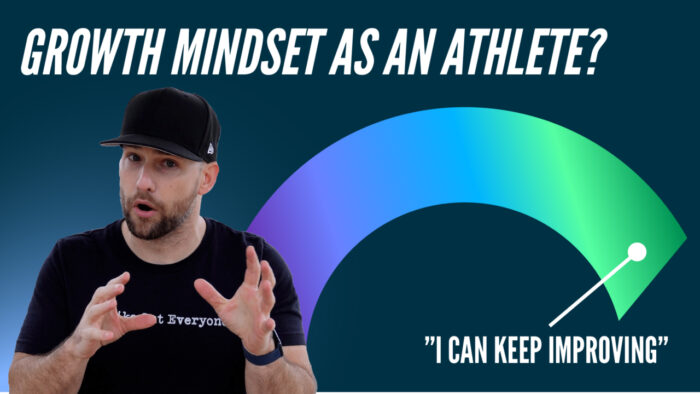*This article may contain product links which pay me a small commission if you make a purchase. Learn more.
For athletes to reach their potential and feel good about their accomplishments, they need to adopt a growth mindset.
In this article, let’s discuss what a growth mindset is and how it can benefit athletes in their sport and in life.
What Is a Growth Mindset?
A growth mindset means that when a person encounters failure or does not perform as well as they would like, they don’t take it as a final judgment of their ability – that they’re not good enough and never will be.
Instead, those with a growth mindset view challenges and failure as an opportunities to learn, improve, and grow their skills.
I believe that I can find a new way to enhance my skills, learn new things, and continuously improve throughout my life.
What’s a Growth Mindset as an Athlete?
Having a growth mindset as an athlete is particularly important because of how many ups and downs and variations in competition there are during a career in sports. Athletes succeed by making better teams and facing better competition, but this success means they face new, greater challenges every time they move up.
So, athletes are constantly tested – as soon as they succeed, they move up and face bigger challenges. If an athlete views failure or difficulty at each higher level, as permanent, they’ll start to give up. But if they view these failures as learning experiences and as challenges to improve their skills, they can continue to get better and succeed in the longterm.
In short, athletes with a growth mindset perceive failure and roadblocks as temporary setbacks, rather than permanent obstacles. These obstacles present opportunities to gain more skills, acquire new knowledge and surpass their own expectations.
“I Can Get There.”
I have had to overcome numerous challenges in my career, including two major injuries that required surgery.
Instead of giving up, I embraced a growth mindset, viewing these injuries as opportunities to overhaul my mechanics (I was a pitcher in baseball) and remake myself.
I focused on what I could control rather than what I couldn’t and focused on the longterm view of my skills. This mindset has not only assisted me in my athletic career but also in my professional life as an author and YouTuber.
For me, setbacks provided opportunities to develop resilience and force me to grow and reach outside of my comfort zone. I regarded these challenges as occasions to learn new skills and reach some of my personal goals.
Writing my first book was a huge challenge – something that I didn’t know I could do, but trusted that if I kept writing and taking advice from others, I’d be able to write a book. A few years later, I had written four.
As An Athlete, A Growth Mindset Means “Not Yet”
Psychology researcher Carol Dweck explains that “not yet” is a powerful tool – she explains that those with a growth mindset view the world with the attitude that they may not have certain skills yet, but if they work hard, they might develop them someday.
Keep Improving Your Entire Sports Career
Athletes MUST view obstacles and setbacks as opportunities to learn and grow, rather than insurmountable barriers.
By embracing a growth mindset, an athlete can always find ways to improve, grow, and achieve their goals, regardless of how difficult they may appear.
